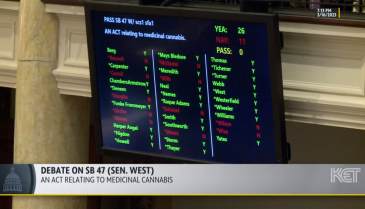
Kentucky Senate lawmakers have approved legislation, Senate Bill 47, establishing a medical cannabis access program for qualified patients with an authorization from their physician.
The legislation institutes a governing body to regulate medical cannabis use and distribution in the Bluegrass State. Patients will be permitted to have a 30-day supply of medical cannabis at their residence and a 10-day supply on their person.
Kentucky NORML Deputy Director Lauren Bratcher praised lawmakers’ advancement of the legislation. “There is substantial evidence that marijuana-derived medications can and are providing major health benefits. This new law takes an important step toward providing relief to patients living with extraordinary pain and illness. I’m heartened that the Legislature understands the medicinal benefits of medical cannabis. Kentucky can now benefit from the same reduction in opioid fatalities observed by states that have already implemented medical cannabis laws”
The bill provides certain protections for patients and their caregivers, and it makes allowances for student patients to access cannabis at school. Patients will not be considered under the influence solely based on the presence of THC metabolites. The legislation does not allow for inhaled cannabis nor does it allow for patients to home cultivate their own cannabis.
The measure is now scheduled for final votes in the House of Representatives later this month. In 2020 and 2022, the House overwhelmingly approved medical cannabis legislation. Once approved by the House, Democratic Gov. Andy Beshear is expected to sign the measure into law.
Upon enactment, Kentucky will be the 38th state to regulate medical cannabis production and distribution. For more information, visit Kentucky NORML.
Related
Medical Disclaimer:
The information provided in these blog posts is intended for general informational and educational purposes only. It is not a substitute for professional medical advice, diagnosis, or treatment. Always seek the advice of your physician or other qualified healthcare provider with any questions you may have regarding a medical condition. The use of any information provided in these blog posts is solely at your own risk. The authors and the website do not recommend or endorse any specific products, treatments, or procedures mentioned. Reliance on any information in these blog posts is solely at your own discretion.






